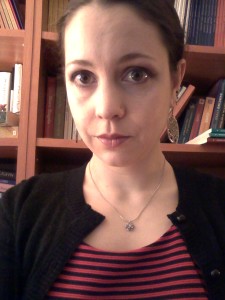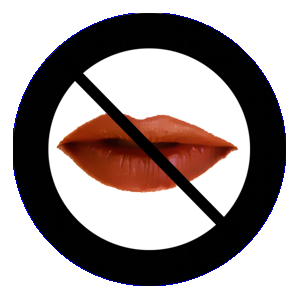
I try to create an inclusive space when I teach, and that means everything from learning my students’ names (even when there are a lot of them!) to not having policies that would make people feel unwelcome (like, I don’t require students to ask me to leave the classroom for any reason; I figure they’re adults, I should treat them as such, plus such a policy might single out students with a disability or medical condition requiring them to stand and stretch their legs or visit the bathroom regularly).
This sense of trying to be an inclusive teacher also extends to how I use language, and how I encourage my students to use language in their writing and speaking. And here, too, my goal of teaching critical thinking skills creeps in, as it often does, because it turns out that being attuned to social justice concerns (those foregrounded in inclusivity practices) also correspond with acknowledging the complexity and diversity of the world around us, and responding with curiosity and empathy rather than trying to wedge everyone and everything into narrow boxes.*
All of this is why I don’t use “male” and “female” as nouns, and why I’d encourage others to give it some thought as well.
First, the history of these words makes it clear that they have a very specific meaning and narrow usage, which I don’t think should be generalized to “hello, I am addressing a group of humans outside of a medical/reproductive context.” According to the Oxford English Dictionary, “female” popped up in European languages in the 1300s to mean “A person of the sex that can bear offspring; a woman or a girl.” In addition to the noun usage, female also has an adjective meaning: “That belongs to the sex which can bear offspring (contrasted with male); characteristic of or relating to this sex.” And while I’m less upset by the use of the word as an adjective, it still has that icky reproductive-connotations thing going on. And for what it’s worth, I’ll point out that there are way more entries under the adjective section of the word than the noun section of the word.
Second, I believe addressing people as males and females is potentially exclusionary. I look at all the wealth of information we have about different genders (there are more than two!) and sexes (also more than two!) and I think, why would I address people using binaristic language that’s bound to leave someone out? Maybe someone in my classroom is intersex, trans, or non-binary. Remember, according to some research estimates, around 1.7% of people have an intersex condition and around .5% of the U.S. adult population is trans so combining those facts and knowing that if I teach around 100 students every semester means I’m gonna choose less exclusionary language, even if it only helps one person in one hundred. Not all of these identities are visible to the naked eye, either, so it’s entirely possible that there are others in my classroom who don’t know they’re intersex yet (I mean, I haven’t had karyotyping done, have you?!), or they’re exploring their gender identity, or…there are so many possibilities, I’d rather err on the side of being more inclusive.
Third, as Carrie Cutler points out in a Slate article, “female” is often an adjective used to manage the meaning of a noun…when it’s assumed the noun is a broad category that usually includes men. So we’d say “female scientist” because upon hearing “scientist” one might assume we were talking about a dude scientist. And something about that just sets my teeth on edge, that we have to keep specifying that it’s a woman doing the job that used to be only done by men, and we still need modifiers to do this work instead of just assuming that women can be included in the catch-all profession of scientists.
Fourth, there are some, uh, connotations. In the Slate article linked above, the author points out the use of “female” in song lyrics (which I shan’t reprint here) to refer to sexually available women. And I think this is an equity issue: women are often discussed in terms of their sexual availability and desirability to men (let alone how we might feel about ourselves or one another!), and until men undergo the same level of objectification women do, I’m gonna be a little prickly about it. Not that feminism should be a tit-for-tat leveling of the playing field so everyone gets equally dehumanized, but these discrepancies bother me, since I don’t think any gender is more sexually anything than another.
As one researcher in STEM writes, this has professional implications too: “In a work setting, would you refer to the Vice Chancellor as a girl? Probably not, because we are accustomed to being respectful to people in senior positions. So should we extend that respect to women in other roles as well? (hint: yes)”
Some scholars go so far as to argue that gender difference (often expressed in terms of sex difference) exists in the first place to police who has access to power, and honestly, I’m not far away from this stance myself. In Sex Is As Sex Does: Governing Transgender Identity by Paisley Currah, for example, it’s argued that:
In European, and, later, American legal traditions, gender difference was codified in laws designed to limit the rights and resources available to white women. From coverture to inheritance laws to the inability to vote to exemptions in the criminal sphere for marital rape, the law’s distincions illustrated how deeply patriarchal norms were incorporated into state structures. (20)
Oh, but that’s all changed, we’re sooo much better, yay feminism has done its job, you say? Currah (and I) would disagree: “gender subordination remains one of the organizing principles of domestic life, the workplace, and cultural production” (24). Why on earth would I use binaristic language that supports this historical and ongoing suborbination?!
Finally, there’s the question of audience. When I’m addressing my college students, I don’t really need to say “Greetings, males and females, today in class we’re going to read…” because drawing attention to my students’ (presumed) biological sex is simply not relevant in most if any classroom settings. Is it relevant in other settings? Gotta say, I’m drawing a blank. The 2024 Paris Olympics brought the debate about biological sex traits in elite sports to the public stage, and I mostly don’t feel qualified to weigh in on it (see my response here); yes, there tend to be some distinctions between the bodies of cis men and those of cis women in terms of muscle growth, metabolic functioning, and so on, and in certain sports those differences may matter. However, I know from research (and honestly, having a lot of trans friends, whom I appreciate sharing their experiences with me) that the human body is extremely malleable and responsive to hormonal interventions, so I don’t see it as my place to weigh in on this except to urge us all to remember that bodies have so much diversity and variation beyond the element of sex, it just doesn’t make sense to me to make it a really rigid distinction unless the athletes in that sport agree on it. (and please recall, one of the boxers who fought Imane Khelif was basically like “yeah, whatever” when her biological differences were brought up, so if athletes within the sport aren’t bothered by it, I don’t see why non-athletes should be bothered by it).
Hm, okay, when are other contexts where we might wanna say “males” or “females”? Do I ever want to signal something that feels very womanhood-specific to my fellow females? Not really, because I don’t care to enter any debates on how we’re defining femaleness and womanhood. For example, if the connotation of female relates to reproductive bits, are we still calling cis women who’ve had hysterectomies females? What about trans men who started out with that kind of anatomical equipment but ditched it? I don’t see a need to get into the weeds with this sort of thing, so I’ll say what I mean: “Ugh, I’m on my period and it sucks, who can relate?!” and that gets the job done in my opinion. Or if I want to talk about experiences of having my worth tied to my perceived beauty or sexual availability, then I’ll address fellow women, noting that this leaves room for people to weigh in whether you’re cis or trans, because trans women are women and they’ve had many of the same experiences as me, whereas some people who started life with XX chromosomes and a uterus might have had similar experiences at first which then diverged if/when they transitioned to something less binary or something more masculine. I think my choice of language lets people opt in or out of these kinds of conversations as they choose, and I’m okay with that.
At the end of the day, I’m not the language police. I’m not here to grade you on every single aspect of language use, though I will point out places where I think there’s room to grow in terms of word choice, nuance, and so on. If this is a language choice that you are consciously making and you’re aware of all its implications and you still want to run with it…you do you! We can have one conversation about it in class (which has already happened this semester) and that can be it.
Also, language is constantly evolving! Maybe in 5 years this conversation will be completely irrelevant for whatever reason. That’s fine too. I’m going to make the choice that makes the most sense to me right now, based on what I know and on my desire to signal to the broadest audience possible that yes, you belong here in my classroom, and learning is for everyone.
Defending gendered language that reinforces a binary is a weird hill to die on in my opinion, but whatevs.
*Bit of a rant here and I didn’t want to derail myself while still getting to my main point, but holy crap, fascist and bigoted and authoritarian belief systems are so lazy. Like, they are utterly devoid of both critical thinking skills and empathy, both of which absences annoy me to no end, I mean, at least pick one of the two to go with?! Every -ism or -phobia out there is rooted in essentialist thinking, generalizations, and stereotypes that are simply not true, and if the people believing these things took like 2 seconds to look at history or at the variety of cultures and human variation around the world they’d see the mounds of evidence disproving their irrational and mean-spirited beliefs, but I guess they’re not gonna do that because a) it’d take some effort and b) they’d have to admit they were wrong, and nobody likes that, especially when you’ve made your whole identity into hating some group you think takes away your power. Oh honey, late-stage capitalism has already done that, you really think we queer people are somehow outdoing corporations in making your life miserable?! There would be far more sparkles involved if we ran this shitshow!







